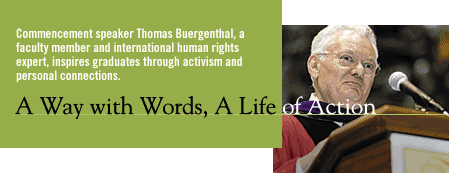
During his Commencement address, Buergenthal shared his views on U.S. international policy.
As a man who is known for his dedication to international human rights through practice as well as scholarship, Thomas Buergenthal, the judge nominated by the United States to sit on the International Court of Justice, was therefore a natural choice for this year’s GW Law commencement speaker. As Lobingier Professor Emeritus of Comparative Law and Jurisprudence, Buergenthal has a reputation of being inspiring and accessible to students.
“He knows the relevant rules and cases on any topic, because he is extremely well-read; but at the same time, he has also practiced international law, and his knowledge is grounded in experience and observation,” says Professor Sean D. Murphy, who co-wrote Public International Law in a Nutshell with Buergenthal. “He lives and works to build a better world. He advocates the means toward that end.”
Buergenthal’s path toward promoting peace and justice began in hardship. Born in Slovakia, his childhood was marred by war. He lived in a ghetto in Poland and in Nazi concentration camps, and was one of the youngest survivors of Auschwitz and Sachenhausen. After the war, Buergenthal came to the United States at the age of 17, eager to gain an education and help pave the way toward peace. He graduated from Bethany College in West Virginia, was a Root-Tilden Scholar at New York University Law School, and received his LLM and SJD degrees in international law from Harvard Law School.
Considered one of the world’s leading international human rights experts, Buergenthal earned his reputation by serving not only on the International Court of Justice, but also as judge and president of the Inter-American Court of Human Rights; serving as the first U.S. member of the U.N. Human Rights Committee and participating in the U.N. Truth Commission for El Salvador; acting as vice chairman of the Claims Resolution Tribunal for Dormant Accounts in Switzerland; and serving as a judge and president of the Administrative Tribunal of the Inter-American Development Bank. He also chaired the Committee on Conscience of the U.S. Holocaust Memorial Museum.
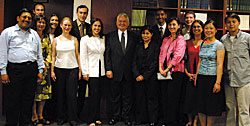
Buergenthal (center) with members of the Buergenthal Scholars Program, which provides tuition to about 15 international students annually.
Photo by Paul Fucito
|
In addition to lending his expertise to GW Law from 1989 to 2000, Buergenthal was dean of American University’s Washington College of Law; held endowed professorships at the University of Texas and Emory University; and was director of the Carter Center’s human rights program at Emory University. He also is a recipient of the Manley O. Hudson Medal of the American Society of International Law, the society’s highest honor.
Now, as a member of the ICJ, he helps to settle disputes between governments and render advisory opinions on legal issues to the UN.
“Since the end of the Cold War, our case load has increased dramatically,” Buergenthal says. Recently decided cases include disputes between Cameroon and Nigeria regarding territorial and maritime claims involving large oil deposits and a case by Mexico against the United States. In the latter dispute, Mexico charged the United States with a violation of a treaty between the two countries that requires Mexican nationals charged with criminal offences in the United States to be informed of their right to seek Mexican consular assistance. Upcoming cases include claims dating back to World War II between Liechtenstein and Germany, as well as cases brought by Bosnia Herzegovina against Serbia and by Croatia against Serbia involving charges of genocide dating back to the Balkan wars.
The greatest challenges and rewards of his work are “deciding cases fairly and having governments resort to the Court ever more frequently in resolving their disputes rather than go to war over them,” Buergenthal says.
Despite his numerous time commitments, colleagues say he’s always ready to give of himself and share his experiences with the GW Law community.
“Judge Buergenthal, like so many successful people, has a delightful sense of humor. Yet, unlike many others who have demanding schedules, he is never too busy to say ‘yes,’” says Susan Karamanian, associate dean for international and comparative legal studies and professorial lecturer in law.
Buergenthal “says yes” to students and faculty members by being a guest lecturer and the founder of the Buergenthal Scholars program, which benefits 15 international students per year. Buergenthal Scholars are supported for one or two semesters and are awarded the honor based on academic merit and financial need.
“This February, Judge Buergenthal was a guest lecturer in one of my classes, and my students were riveted by his discussion of how he came to be an international lawyer,” Murphy says.
In his Commencement address to the graduates, Buergenthal drew from his personal knowledge and experience to comment on the United States’ current reputation and role in global relations.
“Unbecoming of our democratic tradition, we seem to have become intoxicated with our military might, forgetting that even super powers need friends,” Buergenthal said. “It is not enough to preach democracy, human rights, and the rule of law. We must be seen to practice what we preach, not only at home but also abroad.”
Karamanian says Buergenthal’s remarks were thought provoking. “His words raised legitimate, though perhaps unpopular, criticisms about the conduct of our government in matters of grave importance to the United States and the world. After setting forth his criticisms, he adeptly refocused his audience, principally, the graduates, on the challenges that these problems pose for each of them,” Karamanian says. “In this respect, Judge Buergenthal’s message was inspiring and uplifting.”
Ralph Steinhardt, professor of law and international affairs and the Arthur Selwyn Miller Research Professor of Law, says the address was all the more meaningful because of the global impact of Buergenthal’s work.
“We are all the students of Tom Buergenthal. He quite literally gave birth to the field of international human rights law as an identifiable discipline and area of practice. He did this not only through his path-breaking scholarship but also through his sensitive and rigorous teaching for decades,” Steinhardt says. “His contributions as an international jurist have given rise to a humane and integrated jurisprudence—meticulously grounded in the legal commitments states have undertaken for themselves but also shrewdly conscious of the political setting in which human rights abuses typically occur.”
—Laura Ewald
Graduates, Faculty, and Staff Honored at GW Law School’s 137th Commencement
More than 3,000 students, family members, friends, faculty members, and staff members celebrated GW Law’s 137th commencement Sunday, May 23, in the Charles E. Smith Center. Full commencement traditions were honored and the highlight of the event was a speech by Lobingier Professor Emeritus of Comparative Law and Jurisprudence Thomas Buergenthal, an international human rights expert and a longtime friend and member of the GW Law community.
After Interim Dean Roger Trangsrud, marshal of the Law School, announced the commencement, outgoing Dean Michael K. Young and GW President Stephen Joel Trachtenberg presided over the ceremony. Trachtenberg officially conferred degrees on the class as a whole and Young presented individual diplomas to 444 juris doctor students and 105 master of laws students.
Young paid tribute the Law School’s “Old Guard,” graduates from the class of 1954 and before. Marion E. Harrison, LLB ’54, LLM ’59, was marshal of the Old Guard.
Faculty members also were acknowledged in the festivities. Professor Gregory E. Maggs received the Distinguished Faculty Service Award, presented each year by the graduates. Adjunct Faculty Teaching Awards went to Stanimir Alexandrov, SJD ’95; Eileen Barkas Hoffman; and Barry M. Nudelman, JD ’71, LLM ’81.
Among many students recognized for their achievements, Peter A. Swanson received the John Bell Larner Award for the highest cumulative average in the entire course for the juris doctorate degree. The Anne Wells Branscomb Award for the highest cumulative average in the part-time evening division went to Daniel L. Girdwood. Student Bar Association President Eveylon C. “Corey” Westbrook received the Michael Dillon Cooley Memorial Award, given by her classmates in honor of her work and compassion to aid the intellectual and spiritual growth of her fellow students.
The recipient of the Honorary Doctor of Laws degree—conferred by Trachtenberg and hooded by Young and University Marshal Professor Jill Kasle—was Buergenthal, the judge nominated by the United States to sit on the International Court of Justice, the principal judicial organ of the United Nations. Buergenthal was honored for his knowledge in the field of international human rights, dedication to higher education, and service to the University.
In his address, Buergenthal questioned the United States’ current reputation in international relations and charged them to work toward peace and global cooperation.
“Globalization admits us into a world of shared and diverse intellectual, cultural, and spiritual traditions and values,” Buergenthal said. “They bear witness to the inherent unity and beauty of the human family. As human beings and as lawyers you will benefit materially and spiritually by making an effort to understand this world and by becoming part of it.”
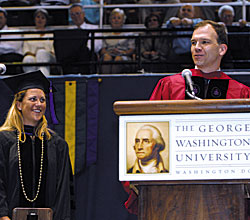
Professor Gregory E. Maggs, a recipient of the Distinguished Faculty Service Award, and Michael Dillon Cooley Memorial Award winner Evelyon C. “Corrie” Westbrook.
|
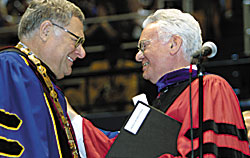
Buergenthal is welcomed by GW President Stephen Joel Trachtenberg.
|
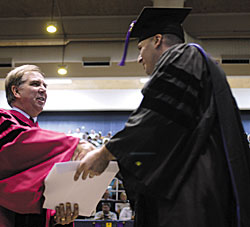
Dean Young congratulates a graduate.
|
Photos by Abdul el-Tayef / wppi
|
Back to top | Summer 2004 Table of Contents
|